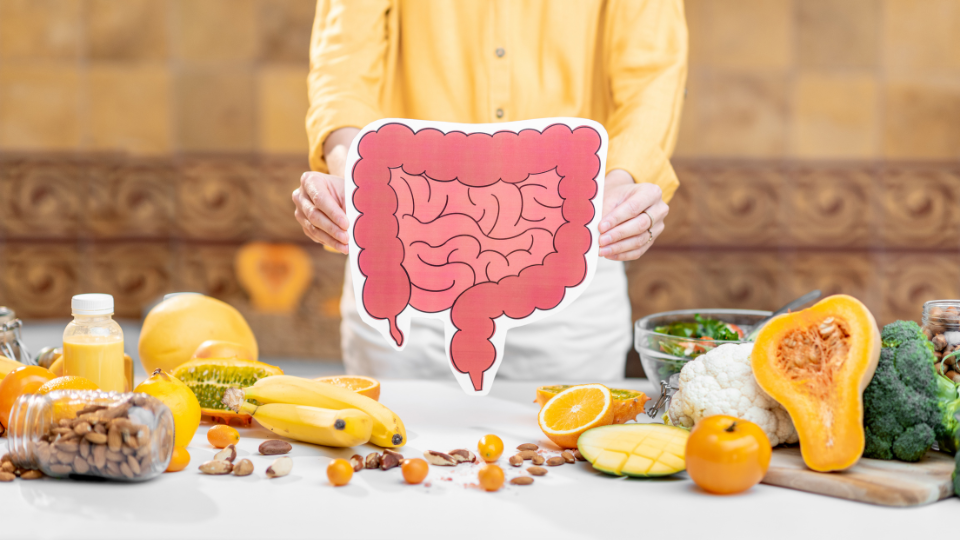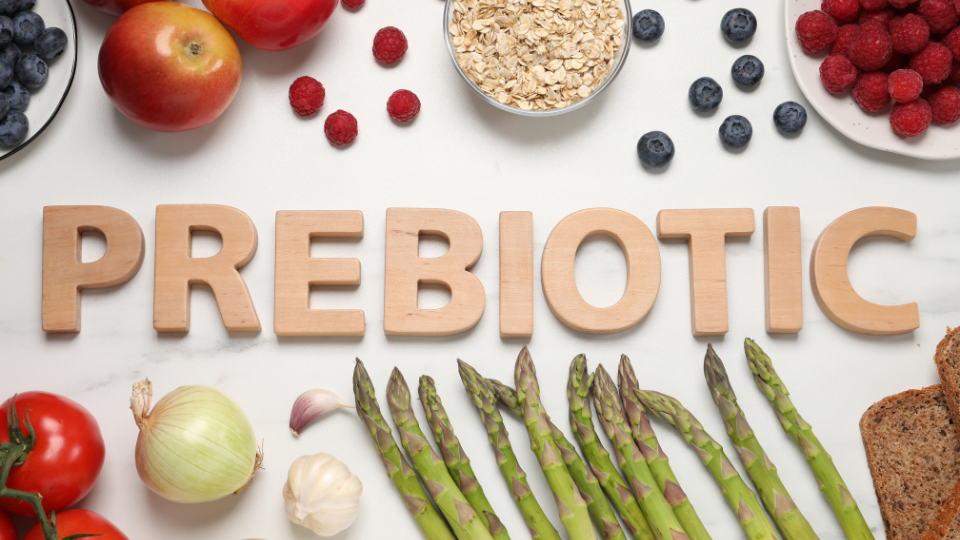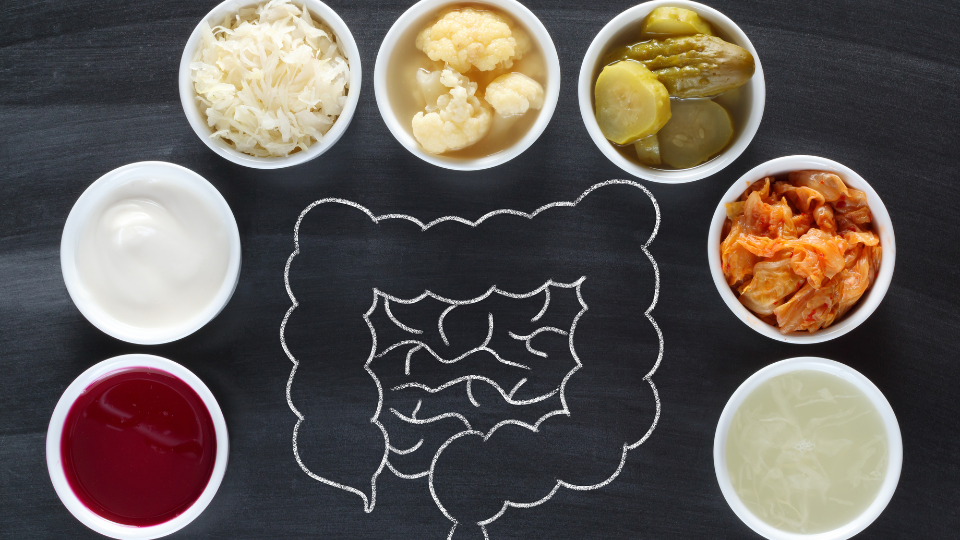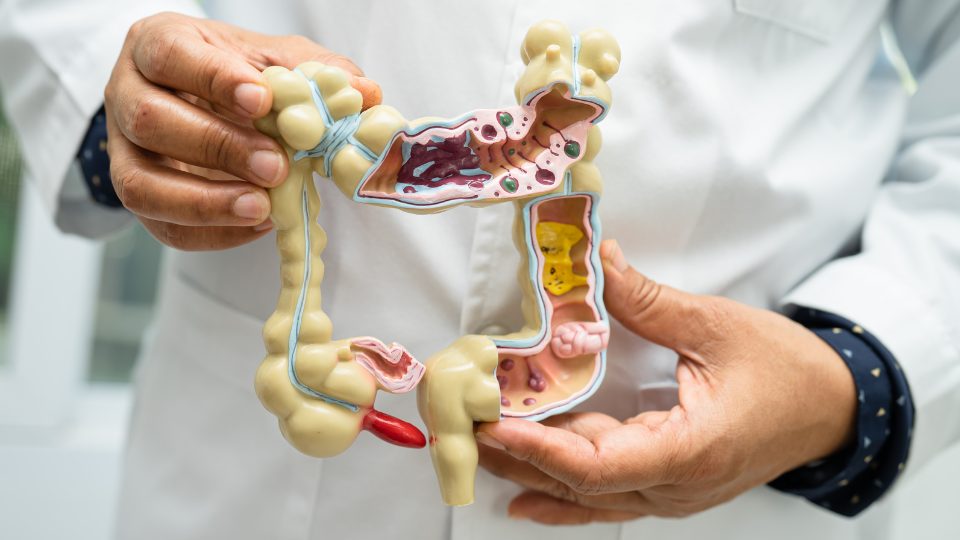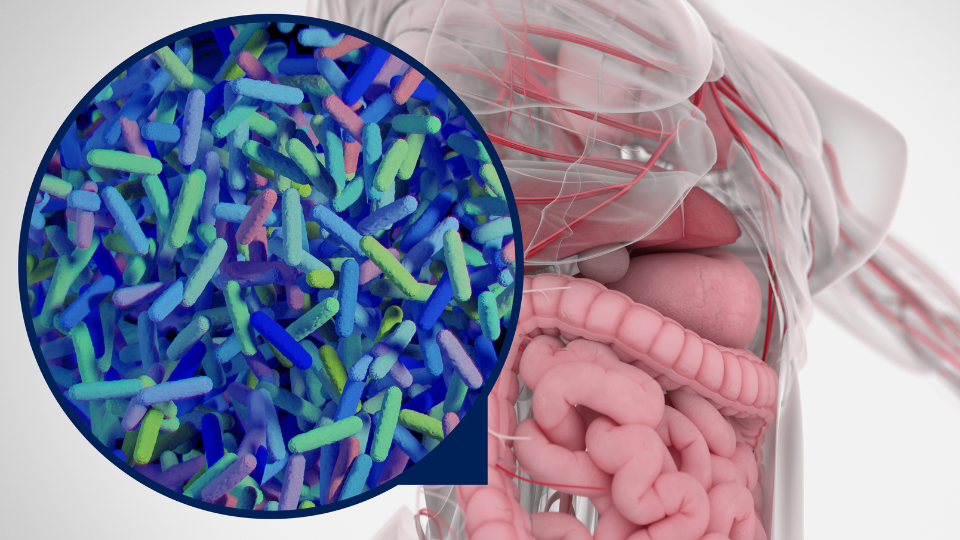Are you curious about how your diet can impact the health of your gut? Well, a recent study has found a fascinating link between a healthy plant-based diet and the presence of beneficial microbes in your gut.
This groundbreaking research suggests that by adopting a plant-based eating pattern, you have the potential to cultivate a diverse and thriving community of microorganisms in your digestive system.
The study, which involved analyzing various interventional studies, discovered that individuals who followed a plant-based diet experienced positive effects on their intestinal microbiota. These effects included an increase in microbial diversity and improvements in overall gut health.
The findings highlight the potential benefits of embracing a plant-based lifestyle, not just for your own well-being but also for the vibrant ecosystem within you.
So if you've ever wondered about the connection between what you eat and the microscopic world inside your body, this article will provide you with evidence-based insights into how a healthy vegan diet can nourish and support your gut microbiome.
By understanding this relationship, you'll be empowered to make informed dietary choices and tailor your daily intake to promote your personal health and contribute to the flourishing community of microbes that call your gut home.
What is the relationship?
A healthy plant-based diet acts as a nurturing garden for the gut microbiome, cultivating a vibrant ecosystem of beneficial microbes. When we consume a plant-based diet, we provide our gut with an abundance of fiber-rich foods that serve as fuel for the growth and diversity of these microorganisms.
The fiber found in fruits, vegetables, whole grains, and legumes is not digested by our bodies. Instead, it serves as food for the bacteria residing in our intestines. This leads to increased microbial fermentation, resulting in the production of short-chain fatty acids (SCFAs) such as butyrate, acetate, and propionate.
These SCFAs play a crucial role in maintaining gut health by reducing inflammation and promoting the integrity of our intestinal lining.
Furthermore, research has shown that plant-based diets have the potential to increase the abundance of certain beneficial bacteria in our gut. Studies have found that individuals following vegan or vegetarian diets tend to have higher levels of Prevotella bacteria compared to those consuming omnivorous diets.
Prevotella is associated with increased production of SCFAs and has been linked to improved metabolic health and reduced risk of diseases such as obesity and type 2 diabetes.
In addition to fostering a diverse microbiome, a healthy plant-based diet also provides essential nutrients that support overall human health. Plant-based diets are rich in vitamins, minerals, antioxidants, and phytochemicals which have been shown to have numerous benefits for our well-being.
For example, certain compounds found in fruits and vegetables can act as prebiotics, which are substances that promote the growth and activity of beneficial bacteria in our gut.
By nourishing these microbes through our food choices, we can enhance their ability to produce vital metabolites that contribute to optimal digestion, immune function, inflammation regulation, and even mental health.
Overall, a healthy plant-based diet plays a fundamental role in shaping the composition and function of our gut microbiome. Combining fiber-rich foods and a diverse array of plant-based nutrients creates an environment that supports the growth of beneficial microbes, which in turn contribute to our overall well-being.
By embracing a plant-based diet, we not only nourish ourselves but also cultivate a thriving ecosystem within our gut, fostering optimal health and vitality.
Effects on Gut Microbiota
Promoting a plant-based eating pattern has been shown to have positive effects on the microbiota composition and diversity of the microbiota in the gastrointestinal tract, according to a systematic review of interventional studies.
The human gut microbiome is composed of trillions of microorganisms, including bacteria, fungi, and viruses, that play a crucial role in maintaining our overall health. By consuming plant-based foods rich in fiber, prebiotics, and phytochemicals, we can support the growth of beneficial bacteria in our gut.
Plant-based diets are associated with lower rates of chronic diseases such as obesity, diabetes, and cardiovascular disease. One reason for this may be their impact on the gut microbiota.
When we consume plant-based foods, they undergo fermentation in our colon by the resident bacteria. This process produces short-chain fatty acids (SCFAs), such as butyrate, acetate, and propionate. These SCFAs have anti-inflammatory properties and help maintain a healthy gut lining.
Additionally, SCFA is crucial for cognitive function in the brain. It serves as an essential component in supporting and maintaining brain health.
Furthermore, plant-based diets promote the production of metabolites that have been linked to various health benefits. For example, certain types of fiber found in fruits and vegetables can be fermented into metabolites called polyphenols.
The effects of microbe-derived metabolites found in these compounds exhibit antioxidant and anti-inflammatory properties, potentially offering protection against chronic diseases such as cancer.
Additionally, plant-based diets are typically higher in omega-3 fatty acids from sources like chia seeds and flaxseeds. Omega-3s have been shown to reduce inflammation in the body.
Adopting a healthy plant-based diet such as a whole food plant-based diet can positively influence the composition and diversity of the gut microbiota.
By consuming an abundance of plant-based foods rich in fiber and phytochemicals, we can promote the growth of beneficial bacteria in our gut while reducing inflammation and protecting against chronic diseases. So why not give it a try? Your gut will thank you!
Interventional Studies
Try incorporating more plant-based foods into your meals and see how it affects your overall health and well-being. Numerous interventional studies have shown that adopting a plant-based diet can have a positive impact on your gut microbiota.
The gut microbiome refers to the community of microorganisms living in our digestive tract, which play a crucial role in maintaining our overall health. When you consume a predominantly plant-based diet rich in fruits, vegetables, whole grains, legumes, and nuts, you provide the necessary nutrients for these beneficial microbes to thrive.
Research has indicated that a plant-based diet can positively influence the diversity and composition of the gut microbiota. A diverse gut microbiome is associated with better metabolism and improved digestion.
On the other hand, an omnivorous diet that includes significant amounts of animal products and high-fat foods can lead to an imbalance in the gut microbial community. This imbalance may potentially contribute to chronic diseases such as inflammatory bowel disease and cardiovascular disease.
One of the key factors contributing to the health benefits of a plant-based diet is its high fiber content. Plant foods are rich in dietary fibers that are not digestible by human enzymes but are fermented by bacteria in our colon.
This fermentation process produces short-chain fatty acids (SCFAs) that help nourish the cells lining our intestines and reduce inflammation.
Additionally, increasing carbohydrate intake from plants while reducing the consumption of animal-based foods has been associated with improved insulin sensitivity and reduced risk of type 2 diabetes.
By switching from a high-fat animal-based diet to a healthy plant-based diet, you can support a thriving gut microbiome through the daily intake of whole plant foods, which plays a vital role in maintaining your overall health.
Benefits of Plant-Based Diets
Improve your overall well-being and support a thriving community of microorganisms in your digestive tract by incorporating more plant-based foods into your meals.
A healthy plant-based diet has been shown to have beneficial effects on the gut microbiota, which refers to the trillions of microorganisms living in our intestines. Research has found that individuals who follow plant-based diets tend to have a more diverse microbial composition in their gut, meaning they have a wider variety of beneficial bacteria, in comparison to a high-fat diets, and omnivore diets.
This diversity is crucial because it is associated with better health outcomes and reduced risk of certain diseases. Here are four ways that a plant-based diet can positively impact your gut microbiota:
-
Increased fiber intake: Plant-based diets are typically rich in fiber, which serves as fuel for the good bacteria in our gut. Fiber cannot be digested by humans, but it can be broken down by our gut microbes into short-chain fatty acids (SCFAs). These SCFAs provide energy for the cells lining our colon and have anti-inflammatory properties, contributing to overall gut health.
-
Higher consumption of healthy plant food groups: With a balanced dietary composition of whole plant foods, you naturally increase your dietary intake of fruits, vegetables, whole grains, legumes, nuts, and seeds. These food groups are known to contain prebiotics - compounds that promote the growth and activity of beneficial bacteria. Examples include onions, garlic, asparagus, bananas, oats, and flaxseeds.
-
Reduced consumption of harmful substances: Plant-based diets often involve cutting out or minimizing high-fat animal foods such as meat and dairy. These foods can contribute to an imbalance in the gut microbiota by promoting the growth of less desirable bacteria that produce harmful metabolites like trimethylamine-N-oxide (TMAO). By reducing or eliminating these foods from your diet and replacing them with healthier alternatives like fruits and vegetables, you can help maintain a more favorable microbial balance.
-
Health effects beyond the gut: The benefits of a plant-based diet extend beyond just the gut microbiota. Research has shown that plant-based diets are associated with a lower risk of chronic diseases such as heart disease, type 2 diabetes, and certain types of cancer. These health effects are likely mediated, at least in part, by the positive impact on the gut microbiota
Impact on Gut Health
Enhancing the diversity of your gut microbiota through dietary choices can have a profound impact on your overall digestive health. A plant-based diet rich in fruits, vegetables, whole grains, and legumes has been shown to promote a healthy gut microbiome.
Studies have found that individuals who follow a plant-based diet tend to have a more diverse microbial community in their intestines compared to those who consume a typical Western diet. This increased diversity is associated with various benefits, such as improved metabolic health and enhanced intestinal barrier function.
One reason why a plant-based diet is beneficial for the gut microbiome is its high dietary fiber content. Plant foods are packed with fiber, which serves as food for the beneficial bacterial abundance in our gut. These bacteria ferment dietary fibers and produce short-chain fatty acids (SCFAs), such as butyrate, acetate, and propionate.
SCFAs play an essential role in maintaining the health of our digestive system by providing energy for colonocytes, improving intestinal barrier function, reducing inflammation, and regulating appetite.
Furthermore, research has shown that plant-based diets can also influence microbial metabolism and the production of microbial metabolites. Certain phytochemicals found in plants can modulate the activity of specific bacterial strains in our gut, leading to changes in microbial metabolism.
For example, some studies have observed that polyphenols present in fruits and vegetables can increase the production of beneficial metabolites like urolithins that have anti-inflammatory properties.
Adopting a healthy whole food plant-based diet can positively impact your gut health by promoting greater diversity among your gut microbes.
The dietary intakes associated with the daily intake of whole plant foods provide ample amounts of fiber to nourish beneficial bacteria and support their fermentation activities.
This results in the production of short-chain fatty acids and other metabolites that contribute to improved metabolic health and intestinal barrier function.
By choosing whole plant foods as the foundation of your diet, you are creating an environment within your gut that supports the growth and activity of beneficial bacteria, ultimately benefiting your overall digestive health.
Microbial Diversity
Research has found that individuals who consume a diverse range of foods have a gut microbiome with over 40% more unique bacterial genes, highlighting the fascinating complexity and importance of microbial diversity in our digestive system. The gut microbiota, also known as intestinal microbes, play a crucial role in maintaining our overall health.
A study comparing the gut microbiota of individuals following a high-fat diet versus those on a low-fat vegan diet found that the plant-based diet was associated with higher microbial diversity and abundance of lactobacillus, which are beneficial lactic acid bacteria.
Microbial diversity refers to the variety of different bacteria present in our gut. Having a diverse gut microbiome is important because it contributes to various aspects of our health, including digestion, immune function, and even mental well-being.
Research suggests that a plant-based diet can promote microbial diversity and microbial abundance by providing an array of fibers and nutrients that support the growth and activity of beneficial bacteria in the gut.
In contrast, high-fat diets and diets rich in processed foods have been linked to reduced microbial diversity and an imbalance in the composition of gut bacteria.
This imbalance may lead to an overgrowth of harmful bacteria or a decrease in beneficial ones. Therefore, adopting a plant-based diet can be an effective strategy for enhancing microbial diversity and promoting overall gut health.
By incorporating more fruits, vegetables, whole grains, legumes, and nuts into your meals, you can nourish your core gut microbiota and create an environment that supports optimal functioning for both you and your microbes.
In addition, consuming fermented foods such as plant-based yogurt, sauerkraut, and kefir can introduce beneficial bacteria to your gut, further enhancing microbial diversity. Furthermore, reducing the dietary intake of processed foods, artificial sweeteners, and excessive alcohol can help maintain a healthy balance of gut bacteria.
Regular physical activity and managing stress levels are also crucial in supporting a diverse gut microbiota.
If you are on antibiotics or otherwise need probiotic supplements, considering incorporating it under the guidance of a healthcare professional. This can potentially contribute to promoting overall gut health and microbial diversity.
Dietary Recommendations
Embracing a diverse range of nutrient-rich foods can have a profound impact on the intricate ecosystem within our digestive system. When it comes to dietary recommendations for maintaining a healthy gut microbiome, a plant-based diet is often suggested as an optimal choice.
Plant-based diets are rich in fibers and complex carbohydrates that serve as fuel for the beneficial bacteria in our gut. These bacteria break down these fibers and produce short-chain fatty acids (SCFAs), which have been shown to have numerous health benefits.
Research has found that healthy subjects following a plant-based diet tend to have higher abundances of certain beneficial bacteria, such as Bifidobacterium and Prevotella, compared to those following a non-plant-based diet.
These bacteria play essential roles in promoting overall gut health and immune function. Additionally, vegan diets are typically lower in saturated fats and cholesterol, which are known risk factors for heart disease.
By reducing the intake of these harmful components, individuals can help maintain healthier microbiome compositions and reduce their risk of heart disease.
Another study revealed that reduced dietary intake of carbohydrates by obese subjects results in decreased concentrations of butyrate and butyrate-producing bacteria in feces. These bacteria are crucial in preventing various diseases including colon cancer. Therefore, it's essential to consume low-fat vegan diet that's rich in complex carbohydrates for optimal health.
Furthermore, studies have shown the beneficial effects of plant-based diets on the functions of the gut microbiome. For example, they can enhance the production of SCFAs like butyrate, acetate, and propionate.
These SCFAs provide energy for colonocytes (cells lining the colon) and contribute to maintaining intestinal barrier integrity. They also possess anti-inflammatory properties that can help prevent chronic diseases associated with inflammation such as inflammatory bowel disease.
Overall, adopting a healthy plant-based diet not only supports good microbes in our gut but also promotes overall well-being by reducing the risk of various diseases, including inflammatory and metabolic diseases, through its positive effects on the human gut microbiome compositions and functions.
Frequently Asked Questions
How does the relationship between a plant-based diet and the gut microbiome impact overall health?
A plant-based diet can positively impact your overall health by promoting a diverse and thriving gut microbiome. This vibrant community of microbes plays a crucial role in digestion, nutrient absorption, immune function, and even mental health.
Can a plant-based diet help improve digestive issues and promote a healthy gut?
A plant-based diet can help improve digestive issues and promote a healthy gut. By consuming fiber-rich foods from plants, you can nourish the beneficial bacteria in your gut, which contributes to better digestion and overall gut health.
Are there specific types of plant-based foods that are more beneficial for enhancing the diversity of gut microbes?
Certain plant-based foods, such as fruits, vegetables, whole grains, and legumes, are more beneficial for enhancing the diversity of gut microbes. Including these foods in your diet can help promote a healthy gut microbiome.
Is there any evidence to suggest that a plant-based diet can help prevent or manage certain gut-related diseases or conditions?
A plant-based diet has been shown to have a positive impact on gut health and may help prevent or manage certain gut-related diseases. Evidence suggests that the beneficial microbes in your gut thrive on a plant-based diet, promoting overall digestive wellness.
Conclusion
In conclusion, adopting a healthy plant-based diet can have a remarkable impact on the composition and diversity of your gut microbiome. Numerous interventional studies have consistently shown that embracing a plant-based eating pattern leads to an increase in beneficial microbes in the gut, which is like nurturing a lush garden teeming with vibrant flowers.
These microbes play a crucial role in maintaining our overall human health and well-being. Not only does a plant-based diet promote the growth of good bacteria, but it also offers numerous benefits for our gut health.
The fiber-rich nature of plant foods acts as fuel for these microbes, allowing them to flourish and carry out their vital functions. This symbiotic relationship between our diet and the human gut microbiota has been linked to improved digestion, enhanced immune function, reduced inflammation, and even mental well-being.
Furthermore, by diversifying our food choices with various plant-based options such as fruits, vegetables, whole grains, legumes, nuts, and seeds - we are not only nourishing ourselves but also supporting the ecosystem within our bodies.
Just like how a diverse forest ecosystem thrives with different species interacting harmoniously, our gut microbiome thrives when exposed to an array of plant-derived nutrients.
Therefore, if you're looking for evidence-backed ways to optimize your gut health and overall well-being in a holistic manner - consider incorporating more plants into your diet.
By doing so, you'll be cultivating an environment within your body that is abundant with beneficial microbes like a flourishing garden buzzing with life. Remember: what you eat directly influences the health of your gut microbiome, so choose wisely!
Next Steps
Congratulations! Now you the beneficial effects of healthy plant-based diets such as a whole food plant-based diet has on your gut health.
Looking to eat healthy? We can help!
- Book an online consultation with Dr. Achyuthan Eswar for a personalized medical consultation to prevent, treat and better manage lifestyle diseases through diet and lifestyle.
- Learn to cook delicious whole food plant based goodies and sign up for courses on health and wellness from the comfort of you home. Join our online courses from anywhere in the world.
- Get daily essentials to cook healthy meals at home.


